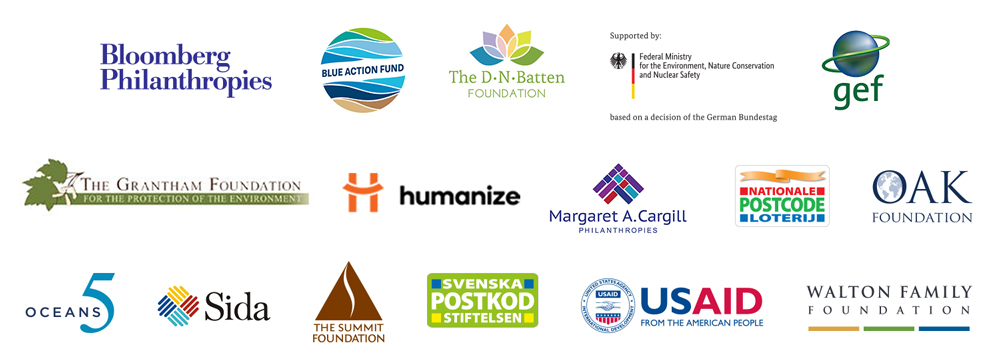Make sure you never miss an update. subscribe to the progress update newsletter
In this issue, find news and updates on:
FollowING the Footsteps of Southeast Sulawesi
Building the Environmental and Social Resilience of Mozambique’s Coastal Fisheries
Visualizing Social Change in Brazil
Deploying the Hub from Asia to Central America
In Other News
The Science of Fish Forever – What We’re Reading
Follow the Footsteps of Southeast Sulawesi
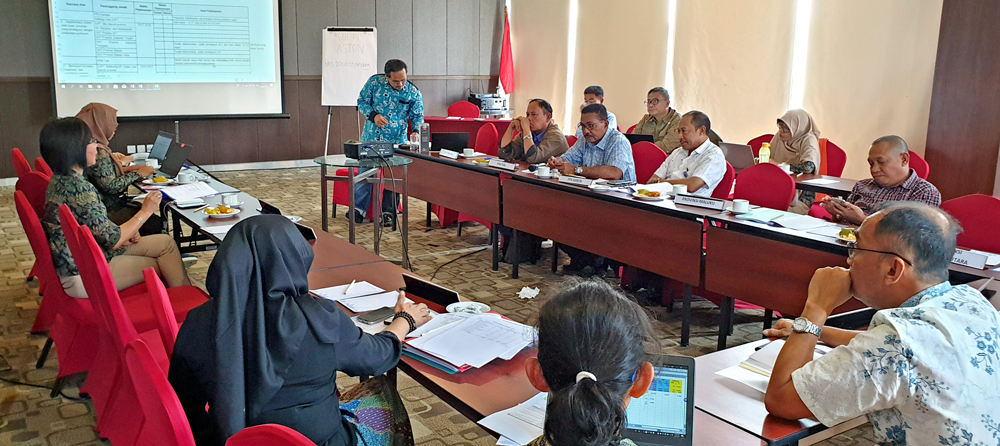
As has been reported regularly in these Fish Forever Progress Updates, Rare in Indonesia has been working closely with the Southeast Sulawesi provincial government to integrate Fish Forever’s technical solution, managed access with reserves, into its fisheries management planning. Most recently, at the end of June, participants at a meeting organized by Indonesia’s Ministry of Marine Affairs and Fisheries (MMAF) and facilitated by Rare agreed to integrate the managed access with reserves management approach and activities currently implemented in Southeast Sulawesi province into the management plans of FMA 714—one of Indonesia’s eleven Fishery Management Areas.
This is a critical milestone for small-scale fisheries management in Indonesia for many reasons. For one, FMA 714 is a large and valuable marine area that covers the marine waters of five of Indonesia’s 34 provinces: Southeast Sulawesi, Central Sulawesi, East Nusa Tenggara, Maluku, and North Maluku. Importantly, it encompasses a large area of the Banda Sea, in the heart of the Coral Triangle—a region of globally high marine biodiversity. Given this great diversity, the majority of FMA 714 is being fished by coastal fishers, with demersal (bottom-feeding) fish, small pelagics, coral reef fish, and mud crabs as their targeted catch. The potential value of these fish in FMA 714 is over USD 600 million dollars. Integrating a managed access with reserves management approach into this FMA will help to support the fish stock and those coastal communities who depend on it for food and income.
Secondly, integrating this approach creates the foundation for using it in other provincial fisheries management plans. During the recent meeting, not only did members of the Southeast Sulawesi MA+R (managed access with reserves) Working Group, such as officials of the Marine and Fishery Agency of Southeast Sulawesi province and MMAF’s Oceanic Fishery Port of Kendari, share their experience and lessons on using this approach, but MMAF also urged other FMA 714 stakeholders to follow the footsteps of the Southeast Sulawesi government in implementing MA+R as an effective instrument in small-scale fisheries management.
Read past updates regarding Rare’s work with Indonesia’s Southeast Sulawesi province:
Southeast Sulawesi (SES) Provincial Marine Spatial Plan Update
Indonesia’s Southeast Sulawesi Province Invests in Coastal Fishers
Broadening the Use of Village Funds for Indonesia’s Coastal Fisheries
Building the Environmental and Social Resilience of Mozambique’s Coastal Fisheries
A project funded by the Swedish Postcode Foundation
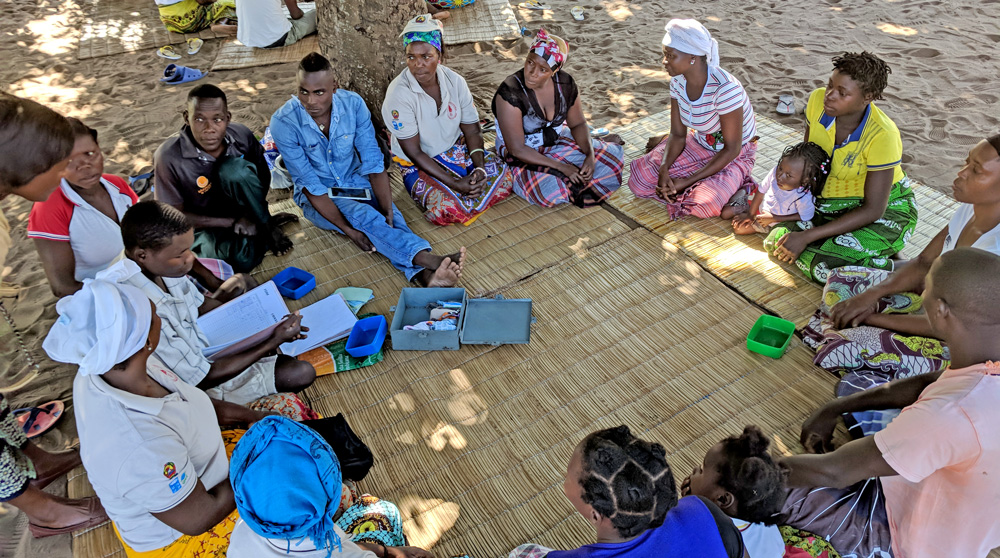
Fish Forever in Mozambique, with support from the Swedish Postcode Foundation and in partnership with fishing communities and the Mozambique government, has successfully demonstrated a scalable solution that addresses three perennial challenges facing the country’s fishing sector: incomplete information about who is fishing and how much they catch, and their limited capacity to use data to make informed decisions in planning for the future.
Through the project, which ran from January 2018-March 2019, Fish Forever and partners integrated appropriate technology with behavioral insights to encourage and sustain new data collection systems, and then empowered individuals, communities and government with training and capacity building to use this data for better marine resource management. The results of this effort? Over 1,000 fishers registered, 14,000 Kg of fish catch recorded (with a dockside value of $32,000), 120 households trained in financial literacy, and 18 savings clubs established with 425 members.
What do these results mean? Generally speaking, they make the hidden economic value of the fisheries more visible and highlight the value of including small-scale fishing communities as key to their management. They also emphasize the co-benefits that come with a multi-faceted approach. E.g., for fishing communities, it emphasizes that registration and data collection— if coupled with financial literacy training and savings clubs— become more than just “reporting back to people in power”, but a complementary tool to increase financial resilience and improve financial planning. For governments and decision-makers, it represents a bottom-up and feasible way of collecting real-time and reliable catch and economic sector data. Overall, the project has laid the foundation for replicating and scaling this effort throughout Mozambique’s coastal fishing communities.
The project has also has gained direct support from the national government to expand this approach to other areas as the mechanism to improve its use of data for decision-making. The evidence and need for this type of approach were presented to the national government at an event hosted by the Ministry of Sea, Inland Waters and Fisheries as part of Mozambique’s “Growing Blue” conference in May 2019. Following that workshop, the government asked Rare to scale the fisher registration system to an entire province—to demonstrate this work at a sub-national scale—and integrate the fish catch monitoring system, called OurFish, into government data systems for national statistics.
Further, to foster long-term sustainability of the project’s impacts, the progress, insights, and lessons learned will continue to inform community-based coastal fisheries management and governance in Mozambique. They will inform Fish Forever projects in Mozambique (with funding from the Blue Action Fund and the Swedish International Development Agency (SIDA)) and the data collected will be used to inform sub-national and national policies on small-scale fisheries.
Visualizing Social Change in Brazil
When Rare Brazil consults with new coastal fishing communities to decide how to build stronger community-based coastal fisheries management, the fishers and community members often bring up similar barriers to improving management: “I’m not willing to share my knowledge or opinion. I do not trust in this process. I don’t know what the consequences of these decisions over my fishing will be. I don’t understand what’s being discussed.”
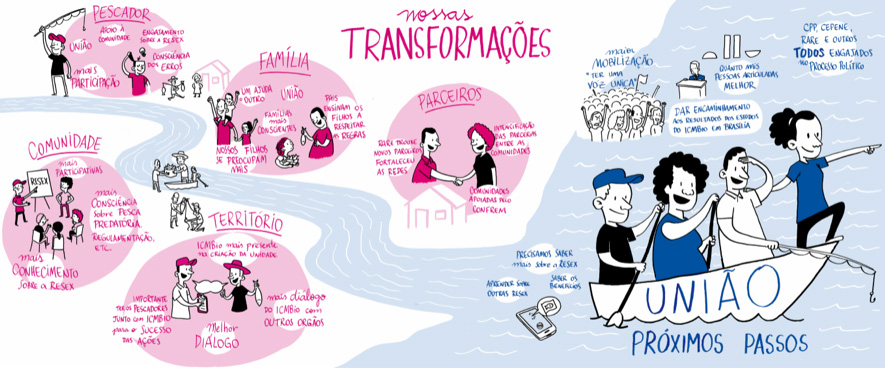
In response, the Brazil team introduced graphic facilitation initially in training its campaign teams to help them visualize the many components that contributed to engaging coastal communities in fisheries management. This technique, which translates conversations or presentations into text and pictures in real-time, has now become a featured tool used in community and partner engagement, as it breaks down complicated technical work and discussions into accessible, emotional representations. The simple cartoons remove barriers to local stakeholder participation in fisheries management—the visuals do not resemble any particular racial groups, rely minimally on written language, and focus on local people.
A fisher and workshop attendee in Delta do Parnaiba recently reported after seeing the graphic produced, “For the first time I felt my voice being heard. I can see in this panel everything I tried to explain. I’ll be back for the next meeting.”
Impressed with these results, the Brazil team is exploring how to apply this approach to local management plans to again remove barriers in community interpretation of local plans. Rare’s partners are also taking notice of the approach’s efficacy—ICMBio, for example, will be replicating the practice of graphic facilitation in meetings and workshops that their institutions lead in Brazil.
Deploying the Hub from Asia to Central America
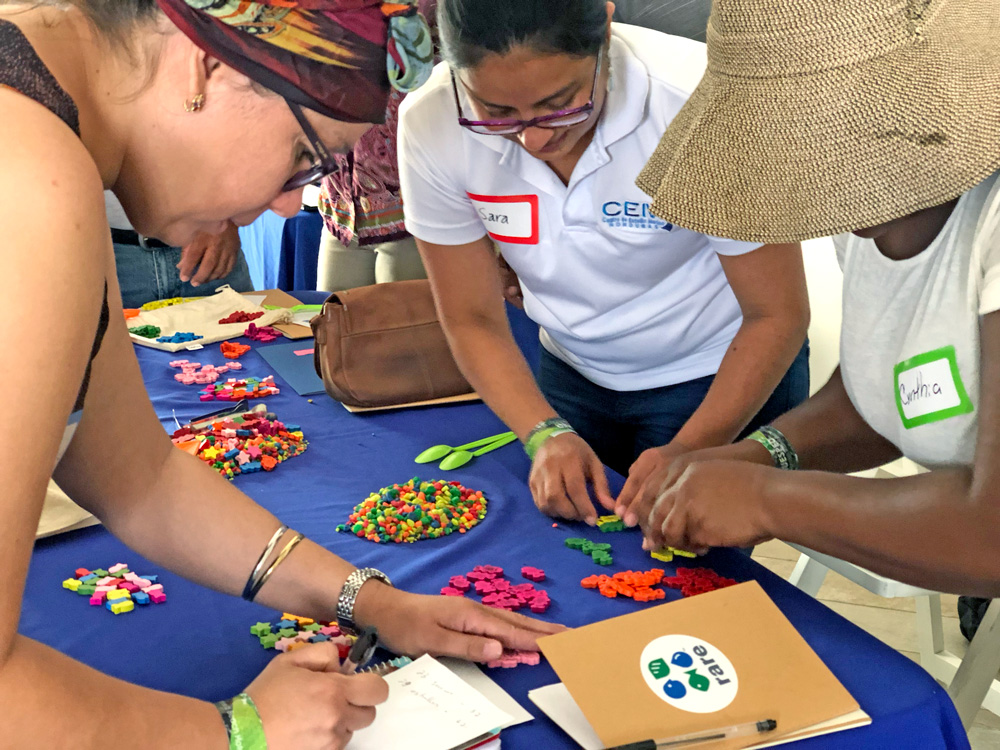
Fish Forever’s new training and capacity building hub, based in Rare Philippines, is in full swing. Fish Forever partners and site implementation teams in the Philippines, Mozambique, Guatemala, and Honduras have completed comprehensive trainings, led by in-country and Hub staff, on essential elements of implementing the Fish Forever program in their countries. Training participants, including representatives from fisher associations, local governments, and NGOs, were already employing the new tools and knowledge within their respective organizations, teams, and municipalities and with target communities the week following the training.
It was incredible how by applying what I learned during the training, I was able to help communities understand, in a simple and easy way, the important role fisheries play in their communities and their lives—and that they need to take action to not lose this resource.
Mariela Ochoa, Workshop participant from the Center for Marine Studies (CEM)
The week-long training in the Mesoamerican Reef region included site visits to local fishing communities. These visits provided participants the opportunity to use qualitative research tools to gain insights into the communities’ behavioral motivations and barriers to action and observe the initial stages of forming local savings clubs. The recent support visit in Mozambique focused on conducting a value chain analysis pilot to better characterize the fisher-buyer relationship in a Mozambique community. The hub will continue to regularly train and advise Fish Forever partners and site implementation teams around the world for even greater strategic support to partners and implementing teams.
Read about the Hub’s launch HERE.
In Other News
OurFish in Wakatobi Shows Increased Catch
With the OurFish digital app now in use by fish buyers in various Indonesian coastal fishing communities to monitor fish catch, Rare conducted a quick analysis to understand how the data changed in moving from a paper logbook to a digital app — comparing historical catch data from similar time periods, January-June 2017 (using a paper logbook) versus January-June 2019 (using OurFish) in the Wakatobi region. In the case of OurFish, the total weight, income, and number of species recorded far exceeded that captured by pen and paper. For example, 358 kg of fish was recorded in six months of 2017 versus 4,244kg recorded in 2019. In another such example, a buyer in Wakatobi inputted 13 records during this same time period, using paper, but inputted 712 records using this new digital system. Such snapshot data validates the utility of working with fishing communities to adopt digital fish catch monitoring through our Fish Forever partnerships.
Rare Featured on Philippines National Television
Swarms of sardines swim with sea turtles in the coastal town of Moalboal, a popular tourist destination in the province of Cebu. In this clip from Born to be Wild, an environmental documentary program on GMA News TV, Rare Philippines program implementation manager Romel Kirit explains the importance of marine protected areas and regulating tourism in sustaining the abundance of coastal fisheries in the Tañon Strait Protected Seascape.
New Ordinances and Engaged Communities in the Tañon Strait
Progress related to community-based coastal fisheries management across the Philippines’ Tañon Strait protected seascape continues, especially in strengthening management bodies as they develop their management plans and adopt new management tools. Two municipalities recently passed their managed access and reserve ordinances with five others in the final stages of municipal council approval. The Strait’s new reserve strategy map (see Fish Forever Progress Update #14 for more information about reserve design) is guiding decisions around expansion and sparking action: one municipality that the maps identified as a critical source of larvae accepted Rare’s invitation to join the seascape’s management network and recently organized its campaign team to initiate training. In addition to supporting seascape-wide improvements to fisheries management, Rare will use the mayors’ network champions to inspire the three new focal regions, including the neighboring Camotes Islands, as well as Siargao Island and the Province of Antique.
Brazilian governing bodies show new interest in adopting Fish Forever’s capacity building initiatives
Across Rare’s work in Brazil – particularly in the new Resex Rio Formoso – the Chico Mendes Institute for Biodiversity Conservation (ICMBio) has recognized that the capacity offered by the campaign managers has significantly improved community participation in RESEX management, resulting in faster implementation of fisheries management agreements. ICMBio is considering how best to leverage these successes for additional RESEX. Local mayors have also taken notice and are supporting the proposal of a new RESEX in Pernambuco based on community support generated from Rare’s campaigns and local capacity building.
The Science of Fish Forever – What We’re Reading
Designing MPAs for food security in open-access fisheries (May 2019)
Cabral, R.B., Halpern, B.S., Lester, S.E., White, C., Gaines, S.D., and Costello, C., 2019. Designing MPAs for food security in open-access fisheries. Scientific reports, 9(1), p.8033.
This study integrated fish population growth rate, fish mortality, fish price, fishing cost, and MPA size into an open-access setting model to determine the influence on food security. The study found that large MPAs optimized catch for species heavily targeted (high value, low harvesting cost), while small MPAs or no closures are best for species lightly targeted (low value, high fishing cost). Food security benefits can be obtained from species of any mobility.
The current application of ecological connectivity in the design of marine protected areas (June 2019)
Balbar, A.C., & Metaxas, A. (2019). The current application of ecological connectivity in the design of marine protected areas. Global ecology and conservation 17, e00569.
This paper reviewed the scientific and management literature to determine how often ecological connectivity is used in designing marine protected areas (MPAs). Only 11% of the 746 MPAs examined considered connectivity as an ecological criterion. Of these, 71% were for protected areas in California and Australia, indicating substantial geographical bias. The authors provided recommendations and a framework to incorporate connectivity into MPA design.
Shifting habitats expose fishing communities to risk under climate change (June 2019)
Rogers, L.A., Griffin, R., Young, T., Fuller, E., St. Martin, K., and Pinsky, M.L., (2019). Shifting habitats expose fishing communities to risk under climate change. Nature Climate Change 9: 512–516.
This study developed a socio-ecological approach to evaluate risk exposure to climate change by using two fishing communities from the east coast of the United States as case studies. The authors found that risk to climate change was strongly dependent on where fishers fish and the diversity of species caught. The study predicted that fishing opportunities would decline unless communities adapt by catching new species and changing fishing grounds.
Rethinking spatial costs and benefits of fisheries in marine conservation (August 2019)
Baker-Médard, M., Allnutt, T.F., Baskett, M.L., Watson, R.A., Lagabrielle, E., and Kremen, C. (2019). Rethinking spatial costs and benefits of fisheries in marine conservation. Ocean & Coastal Management, 178, p.104824.
This research showed that using a cost model of fishery catches for marine reserve spatial-planning can help in identifying important areas for conservation and promote stabilization of local fisheries.
Drawing on data from Madagascar, the study demonstrated that regions most often selected by the model meet conservation targets and are most accessible to community-based resource managers.
Fish Forever: A solution to coastal overfishing – delivered by empowering communities through clear rights, strong governance, local leadership, and participatory management – that protects essential fish habitat and regulates fishing activities to replenish and sustain coastal fisheries.
Goal: To deliver replicable and scalable community rights-based management across ten countries, using a global network of 500 local leaders to secure livelihoods for one million fishers, alleviate poverty, ensure food supply, and protect coastal ecosystems from chronic threats.
Fish Forever Countries: Philippines, Indonesia, Mozambique, Brazil, the Caribbean coasts of Honduras, Guatemala, Belize, and Mexico, and the Pacific Island countries of Palau, Federated States of Micronesia, and the Marshall Islands.
Fish Forever is possible thanks to the support of many, including the following current donors:
